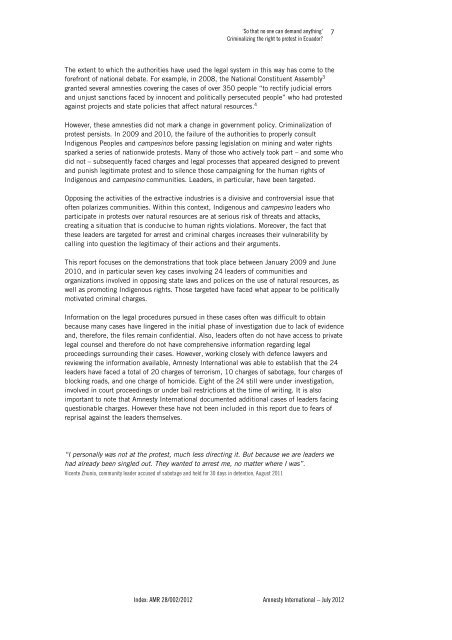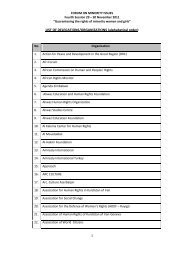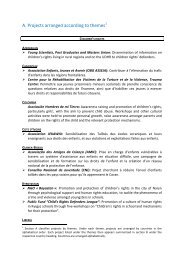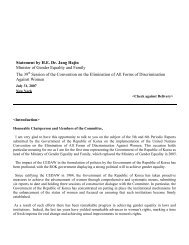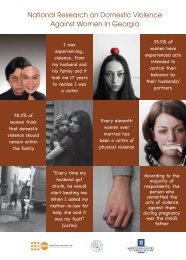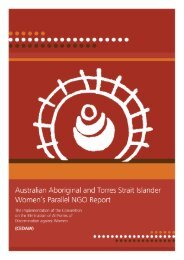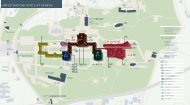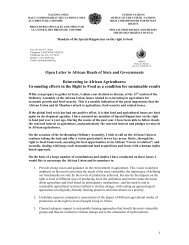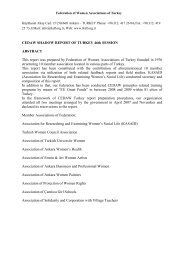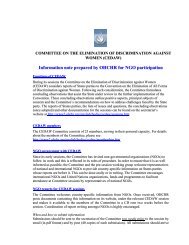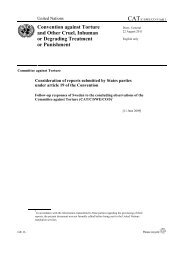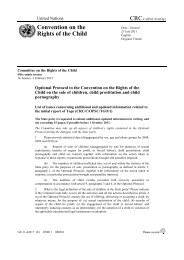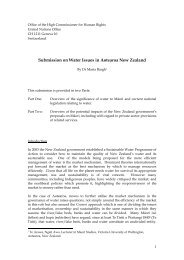'SO THAT NO ONE CAN DEMAND ANYTHING' - Office of the High ...
'SO THAT NO ONE CAN DEMAND ANYTHING' - Office of the High ...
'SO THAT NO ONE CAN DEMAND ANYTHING' - Office of the High ...
Create successful ePaper yourself
Turn your PDF publications into a flip-book with our unique Google optimized e-Paper software.
‘So that no one can demand anything’Criminalizing <strong>the</strong> right to protest in Ecuador?7The extent to which <strong>the</strong> authorities have used <strong>the</strong> legal system in this way has come to <strong>the</strong>forefront <strong>of</strong> national debate. For example, in 2008, <strong>the</strong> National Constituent Assembly 3granted several amnesties covering <strong>the</strong> cases <strong>of</strong> over 350 people “to rectify judicial errorsand unjust sanctions faced by innocent and politically persecuted people” who had protestedagainst projects and state policies that affect natural resources. 4However, <strong>the</strong>se amnesties did not mark a change in government policy. Criminalization <strong>of</strong>protest persists. In 2009 and 2010, <strong>the</strong> failure <strong>of</strong> <strong>the</strong> authorities to properly consultIndigenous Peoples and campesinos before passing legislation on mining and water rightssparked a series <strong>of</strong> nationwide protests. Many <strong>of</strong> those who actively took part – and some whodid not – subsequently faced charges and legal processes that appeared designed to preventand punish legitimate protest and to silence those campaigning for <strong>the</strong> human rights <strong>of</strong>Indigenous and campesino communities. Leaders, in particular, have been targeted.Opposing <strong>the</strong> activities <strong>of</strong> <strong>the</strong> extractive industries is a divisive and controversial issue that<strong>of</strong>ten polarizes communities. Within this context, Indigenous and campesino leaders whoparticipate in protests over natural resources are at serious risk <strong>of</strong> threats and attacks,creating a situation that is conducive to human rights violations. Moreover, <strong>the</strong> fact that<strong>the</strong>se leaders are targeted for arrest and criminal charges increases <strong>the</strong>ir vulnerability bycalling into question <strong>the</strong> legitimacy <strong>of</strong> <strong>the</strong>ir actions and <strong>the</strong>ir arguments.This report focuses on <strong>the</strong> demonstrations that took place between January 2009 and June2010, and in particular seven key cases involving 24 leaders <strong>of</strong> communities andorganizations involved in opposing state laws and polices on <strong>the</strong> use <strong>of</strong> natural resources, aswell as promoting Indigenous rights. Those targeted have faced what appear to be politicallymotivated criminal charges.Information on <strong>the</strong> legal procedures pursued in <strong>the</strong>se cases <strong>of</strong>ten was difficult to obtainbecause many cases have lingered in <strong>the</strong> initial phase <strong>of</strong> investigation due to lack <strong>of</strong> evidenceand, <strong>the</strong>refore, <strong>the</strong> files remain confidential. Also, leaders <strong>of</strong>ten do not have access to privatelegal counsel and <strong>the</strong>refore do not have comprehensive information regarding legalproceedings surrounding <strong>the</strong>ir cases. However, working closely with defence lawyers andreviewing <strong>the</strong> information available, Amnesty International was able to establish that <strong>the</strong> 24leaders have faced a total <strong>of</strong> 20 charges <strong>of</strong> terrorism, 10 charges <strong>of</strong> sabotage, four charges <strong>of</strong>blocking roads, and one charge <strong>of</strong> homicide. Eight <strong>of</strong> <strong>the</strong> 24 still were under investigation,involved in court proceedings or under bail restrictions at <strong>the</strong> time <strong>of</strong> writing. It is alsoimportant to note that Amnesty International documented additional cases <strong>of</strong> leaders facingquestionable charges. However <strong>the</strong>se have not been included in this report due to fears <strong>of</strong>reprisal against <strong>the</strong> leaders <strong>the</strong>mselves.“I personally was not at <strong>the</strong> protest, much less directing it. But because we are leaders wehad already been singled out. They wanted to arrest me, no matter where I was”.Vicente Zhunio, community leader accused <strong>of</strong> sabotage and held for 30 days in detention, August 2011Index: AMR 28/002/2012 Amnesty International – July 2012


